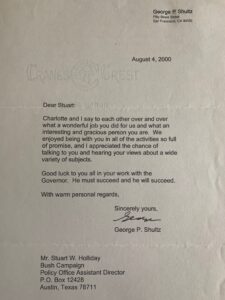One of the great experiences of my life was spending a week with George Shultz, the former secretary of state and four-time cabinet member. I was familiar with Shultz’s reputation for depending on good people within whatever system he was in, always leading from a standpoint of trust, listening to experts and calmly coming to decisions. I was also aware of Shultz’s key role in helping thousands of Russian Jews escape Communist Russia during the Cold War and giving them hope to rebuild new lives in free societies. He was also among the highest regarded political appointees who, through his leadership and trust in others, restored morale in the foreign service, because he recognized these public servants are invaluable assets to carry out the best interests of our country.

At the time I met Shultz, he was serving as general chairman of then Governor George W. Bush’s 2000 presidential campaign. I was assigned to be his aid for the week of the Republican National Convention in Philadelphia. When he came off the elevator with his wife Charlotte, San Francisco’s chief of protocol, he was an immediately familiar and iconic image. He greeted me and surprised me by handing me his schedule for the week and saying, “You look reasonable. Take this and put anything on my schedule that you think will help our man, [George Bush].” It was clear to me this was a man who was confident enough to trust others, even more junior staffers like me at that time.
As the week went on, we spent hours together — and I soaked in all of the wisdom that he shared with so many people, including his famous gardening analogy that he would use to describe the importance of consistent diplomacy every day.
“If you plant a garden and go away for six months, what have you got when you come back? Weeds. And any good gardener knows you have to clear the weeds out right away. Diplomacy is kind of like that. You go around and talk to people, you develop a relationship of trust and confidence, and then if something comes up, you have that base to work from.”
Another favorite quote he used was “one creates paths by walking”. This simple expression, which I’m sure goes back to some early philosopher, underscores the importance of not simply looking at relationships between countries as static but rather how relationships can be strengthened and developed through intentional effort, presence and diplomatic activity. To build the relationships, you must sometimes create the paths for engagement to include the kinds of international exchange for which Meridian is so well-known.
George Shultz was a believer in the power of exchange and collaboration to address some of the major challenges in the world. He believed in passing down his experiences and wisdom to others using very few words, but words that were precise and clear. I distinctly remember a conversation with other foreign policy leaders in which Shultz was asked what he saw as the major threat to the United States in the world. Every other person gave lengthy treatises on a variety of macro subjects and theories. Whereas Shultz replied with one word: “terrorism.” This was more than one year before September 11, when most people could not fathom the scale of that attack on U.S. soil and the decades of international conflict and realignment as a result — but Shultz did. No doubt if he was addressing this question in 2019, before COVID-19 hit us, Shultz would have said “pandemic.” We all need to learn from Shultz the lesson of identifying the next crisis in one or a few words, and plan accordingly before we are in the middle of that next crisis.
As the U.S. seeks to rebuild our diplomatic capability and invest in international engagement, it would be wise to remember the example of George Shultz and his wise albeit minimal words. Strong international cooperation and communication are required to address the generational challenges we face today and in the future. At Meridian, we will keep Shultz’s approach with us as we advance our mission.
















